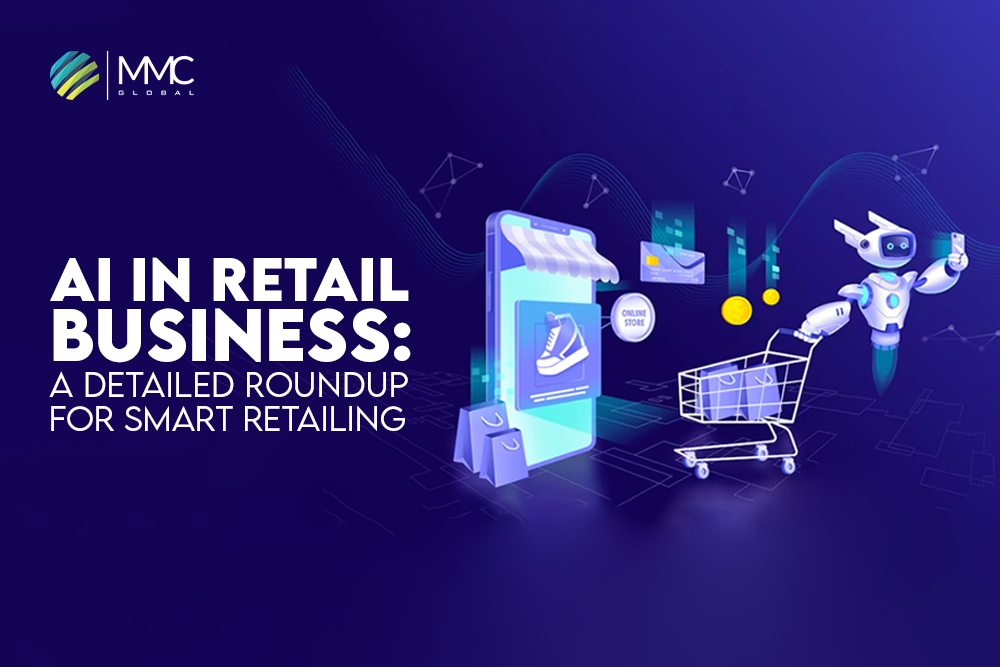AI In Retail Business: A Detailed Roundup For Smart Retailing


In today’s rapidly evolving world, retail business is undergoing a profound transformation driven by advancements in technology. Among these technological innovations, Artificial Intelligence (AI) stands out as a game-changer, reshaping the way retailers operate, engage with customers, and optimize their business processes. In this blog post, we will delve into the fascinating realm of AI in retail business, exploring its various applications, benefits, and future potential.
The Role of AI in Retail Business
Artificial Intelligence is a multidisciplinary field that encompasses machine learning, natural language processing, computer vision, and data analytics. These technologies enable AI systems to mimic human-like cognitive functions such as perception, reasoning, learning, and problem-solving. In fact, Artificial Intelligence supports retail businesses to enhance efficiency, personalization, and customer satisfaction.

Inventory Management and Demand Forecasting
One of the primary challenges in retail is striking the right balance between supply and demand. In fact, overstocking or understocking can lead to significant losses. AI-powered algorithms analyze historical sales data, market trends, and even external factors like weather or holidays to predict demand accurately. Furthermore, it ensures that retailers can optimize their inventory, reduce costs, and minimize product wastage.
Personalized Shopping Experiences
AI in retail business can create personalized shopping experiences that cater to individual preferences. Through data analysis and machine learning, retailers can recommend products based on a customer’s past purchases, browsing history, and demographic information. These personalized recommendations not only increase sales but also enhance customer satisfaction and loyalty. By implementing personalized recommendation engines in mobile applications, web apps, or websites, retailers optimize customer experience and increase sales.
Chatbots and Virtual Assistants
AI-driven chatbots and virtual assistants have become integral parts of the online retail experience. They can provide immediate assistance to customers, answer inquiries, and guide shoppers through the purchasing process. In fact, these AI-driven solutions are available 24/7, improving customer service and reducing response times. Whether embedding it on your website, social media marketing platform, or in-app, you can make your marketing touchpoints futuristic yet modernized.
Visual Search
Visual search technology enables customers to search for products online with images or photos. AI algorithms analyze the image and provide matching product options. This functionality enhances the user experience, making it easier for customers to find exactly what they are looking for.
Pricing Optimization
Retailers can dynamically adjust prices based on various factors such as demand, competitor pricing, and inventory levels. In fact, AI-driven pricing optimization algorithms ensure that retailers remain competitive while maximizing profit margins.
Read more: 5 Instant Artificial Intelligence that can Accelerate Ecommerce Businesses
Loss Prevention
AI-based surveillance systems use computer vision to monitor store security in real time. These systems can also detect unusual behavior or theft and notify store personnel. Moreover, they help prevent fraud at self-checkout counters by identifying suspicious activities.
Supply Chain Management
AI in retail business plays a crucial role in optimizing the entire supply chain process, from production and distribution to transportation and logistics. Moreover, predictive analytics can anticipate supply chain disruptions. It allows retailers to address issues and maintain the flow of goods proactively.
The Benefits of AI in Retail Business
The adoption of AI in the retail business brings about a multitude of benefits that are transforming the way retailers do business.
Enhanced Customer Engagement
AI-powered personalization and recommendation systems foster deeper customer engagement. However, When customers feel understood and catered to, they are more likely to make repeat purchases and remain loyal to a brand.
Increased Efficiency
Automation of routine tasks, such as inventory management and data analysis, allows retailers to allocate resources more effectively. In fact, research proved that A significant 64% of businesses believe that artificial intelligence will help increase their overall productivity. This, ultimately, translates into cost savings and improved operations.
Data-Driven Decision Making
Artificial Intelligence provides retailers with valuable insights derived from vast amounts of data. This data-driven approach enables more informed decision-making, helping retailers adapt to changing market conditions and consumer preferences.
Improved Inventory Management
Another important significance of AI in retail business is the continuous improvement of inventory management. Retailers can also reduce excess inventory and minimize stockouts, leading to improved profitability and customer satisfaction.
Fraud Detection and Prevention
AI-based fraud detection systems help retailers minimize losses due to fraudulent activities, both online and in physical stores. From detecting paid items to system-generated suspicious links, AI in retail businesses strengthens security and prevention.
Competitive Advantage
Early adopters of AI in retail businesses gain a competitive edge by offering innovative services and experiences that set them apart from their competitors.
The Future of AI in Retail
The potential of AI in the retail industry is far from exhausted. As technology continues to advance, several exciting developments are on the horizon. MMC Global revolutionizes your retailing business; whether it is a startup or enterprise-level business, we take retailing experience to the next level.
We provide almost every business solution that can help them to be competitive. Our services highly concentrate on building AI-powered eCommerce solutions for retailers, including web applications, mobile apps, and business-centric automated tools. Moreover, we rejuvenate the AI experience by holding command of OpenAI integrations. Our remarkable journey to be parallel with industry is unquestionable. From creating a GPT-based solution to integrating OpenAI APIs, we have your back.
The potential of AI in retail business is quite interesting to thrive in the market. Let’s see!
Autonomous Stores
Retailers are successfully experimenting with cashier-less stores where customers can pick up items and walk out without going through a traditional checkout process. In addition, AI-powered systems automatically track the items customers take, calculate the total cost, and charge them digitally.
Enhanced In-Store Experiences
AI-driven technologies like augmented reality (AR) and virtual reality (VR) will provide customers with immersive in-store experiences. Shoppers can visualize how products will look or fit before making a purchase.
Predictive Maintenance
Artificial Intelligence can be used to predict when equipment and machinery in retail stores will require maintenance or replacement. This reduces downtime and ensures a smooth shopping experience. Although many retailers have implemented predictive maintenance mechanisms, more are the way to go.
Voice Commerce
Voice-activated devices and AI-driven voice assistants make it easier for customers to shop online using only their voices. This technology will likely become more prevalent, simplifying the purchasing process.
Sustainability and Ethical Sourcing
AI can be employed to trace the origins of products and ensure ethical sourcing and sustainability. Consumers are increasingly concerned about these factors, and AI can help retailers meet these demands.
Challenges and Considerations
While Artificial Intelligence offers immense promise for the retail industry, it also presents certain challenges and considerations that retailers must address:
Data Privacy and Security
Handling vast amounts of customer data requires robust security measures to protect against breaches and cyberattacks.
Ethical AI Use
Retailers must use AI ethically and transparently, ensuring that algorithms do not perpetuate biases or engage in discriminatory practices.
Employee Concerns
Automating certain tasks may raise concerns among retail employees about job displacement. Retailers should consider how to reskill and upskill their workforce.
Conclusion
Artificial Intelligence is revolutionizing the retail industry, enabling retailers to offer more personalized and efficient services while optimizing their operations. From inventory management to customer engagement and beyond, AI is reshaping how retailers do business. The future holds even more exciting possibilities as AI continues evolving and expanding its retail role. Embracing AI is no longer an option but necessary for retailers looking to thrive in the digital age. As technology continues to advance, retailers must adapt and harness the power of AI to stay competitive and meet the evolving demands of consumers. The future of retail is AI-driven, and the possibilities are limitless.



